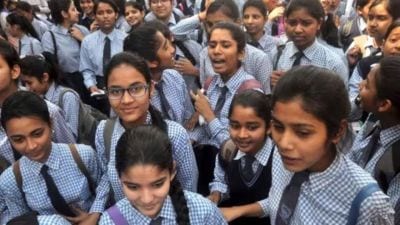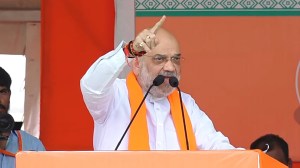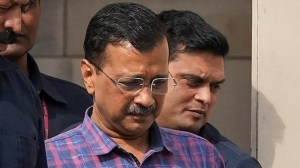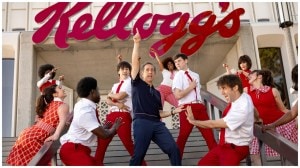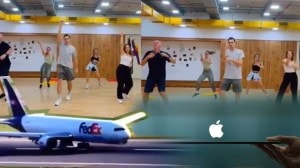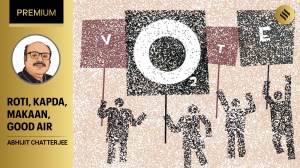- India
- International
Letter from the Palestine encampment in Columbia University: ‘Nobody in Gaza is graduating’
I see solidarity. I see safety. I see the shared hope of a world where people are not unjustly harmed. I see an administration warily peeking from the top of their ivory tower. I do not see unrest, danger, as they would have you believe
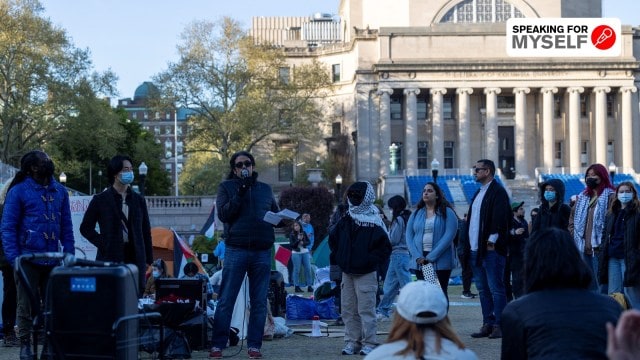 The Gaza Solidarity Encampment stands resolute, based on its Community Guidelines, collectively affirmed and accepted by all who venture into the West Lawns at Columbia. (Photo: Reuters)
The Gaza Solidarity Encampment stands resolute, based on its Community Guidelines, collectively affirmed and accepted by all who venture into the West Lawns at Columbia. (Photo: Reuters)Written by Katha Ray
More than a week ago, students on the University of Columbia’s sprawling campus erected a “tent city” in solidarity with the Palestinian cause. This “Gaza Solidarity Encampment” was set up ahead of the unnerving testimony given by University President, Minouche Shafik, at a congressional hearing with the United States House Committee on Education investigating “Columbia’s ‘failure to protect Jewish students.’” I write this from the encampment where hundreds of students gather with the firm belief that the university is failing to protect its students — all its students.
The Gaza Solidarity Encampment stands resolute, based on its Community Guidelines, collectively affirmed and accepted by all who venture into the West Lawns at Columbia. The first of which is firmly grounded “(in) solidarity with the Palestinian people facing the deadliest year in a 75-year-long US (and Columbia) — funded genocide, of the Palestinian people.” In the encampment, students roam in Keffiyehs and symbolic watermelon paraphernalia (earrings, sweatshirts and the like). The encampment runs programmes daily, featuring talks from faculty, student leaders and proponents of the Palestinian cause like journalist Motaz Azaiza. I don’t own a Keffiyeh yet. I am waiting for the opportunity to order one from Hirbawi, the “last known factory making Keffiyehs in Palestine.”
Protestors at the encampment have concrete demands from the administration at Columbia: Financial divestment from institutions that support the Israeli apartheid state, an academic boycott of Israeli universities, an end to land-grabbing (from Harlem to Palestine), no policing on campus and an institutional call for a ceasefire in Gaza. After the initial deployment of NYPD by Columbia administrators that led to the arrests of at least 100 students, negotiations with student leaders have been ongoing.
The latest escalation was on April 24, when student negotiators claimed they were threatened with the calling of the United States National Guard. Here, the National Guard can be deployed to circumvent domestic unrest, famously last used during the historic anti-racism protests after the murder of George Floyd. That night, as I kept a feverish track of my friends’ locations, my most vivid memory is the murmured refrain of “We keep us safe”.

Around me, I see an elderly woman wearing a black t-shirt that reads “Anti-zionism is not Anti-semitism”. I see a group of undergraduate students doing their economics homework. At the far end of the lawn, I see people dancing to music, while others kick a ball around. There is an art corner where posters are made. There is a first aid tent. There is a “cornucopia”, laden with donated food and beverages.
I see solidarity. I see safety. I see the shared hope of a world where people are not unjustly harmed. I see an administration warily peeking from the top of their ivory tower, completely disenfranchised from the true intention and sentiment of the encampment. I do not see unrest and danger.
Conversation within groups of friends, classmates and colleagues bubble with an urgent kinship. A friend says to me, “I’ve never felt closer to my classmates at Columbia, everybody is kind to each other and I feel a strong sense of community.” In a Columbia-wide email sent on April 18, President Shafik describes the encampment as “severely disrupt(ing) campus life, and creat(ing) a harassing and intimidating environment for many of our students.”severely disrupt(ing) campus life, and creat(ing) a harassing and intimidating environment for many of our students.”
As an international student, my most cherished experience has been meeting the people at Columbia. These are people from diverse places, faiths and life experiences. All of them teach me new things every day. I have been most moved, however, learning about the Jewish celebration of Passover, attending my first Seder in the encampment hosted by Jewish friends whose Jewish values call them to join, in solidarity with Palestine. Unlike what Shafik described, my personal experience at the encampment has been swathed in radical compassion, understanding and attempts at bridging diverse opinions, to centre still unfolding violence in Gaza.
As reports of mass graves being discovered in Gaza and Khan Younis surface, the administration at Columbia is worried about the upcoming graduation commencement, stating in a recent email (their standard mode of communication with students), “(President Shafik is) deeply sensitive to the fact that graduating seniors spent their first year attending Columbia remotely. We all very much want these students to celebrate their well-deserved graduation with family and friends.”
As I look across the encampment to the famous Low Steps of Columbia University, where equipment is being set up for the much-awaited graduation day, I am reminded that nobody in Gaza is graduating.
The writer is a student at the University of Columbia
EXPRESS OPINION
More Explained
May 09: Latest News
- 01
- 02
- 03
- 04
- 05



